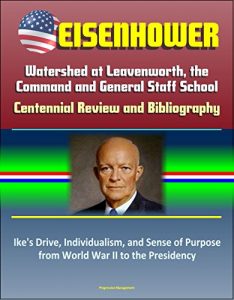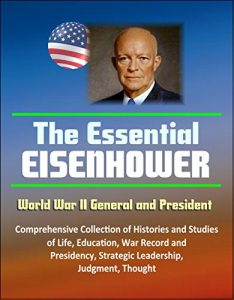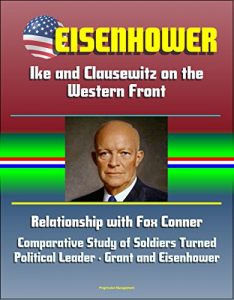These reports have been professionally converted for accurate flowing-text e-book format reproduction. Contents include: Dwight D. Eisenhower and the Command and General Staff School: Watershed at Leavenworth * Eisenhower: The Centennial * Eisenhower Centennial Bibliography * Eisenhower as Strategist: The Coherent Use of Military Power in War and Peace * Eisenhower Doctrine, January 5, 1957 * Farewell Radio and Television Address to the American People.
Eisenhower's year at Leavenworth can best be understood in the context of several themes that characterized his life. One theme was his inspired competitiveness and consistent concern with how well he was succeeding. Ike was a competitor and despite his likability and basic humility was committed to doing his best—especially when he sensed his best was required. To gloss over the obvious in this case is to miss something of the essence of the man. Eisenhower felt himself inspired and was devoted to duty. Ike did not drift into supreme command or the presidency of the United States, and he did not graduate first in his class at Leavenworth without demonstrating considerable drive. His sense of purpose and dedication are exhibited in many small things, masked, perhaps, by his essentially modest personality and affability. His complex character prompts such questions as: What sort of effort did Ike put forth at Leavenworth? How did he study? And, more important for some, "Did Ike play golf at Leavenworth?" Eisenhower's individualism—another theme—also attracts attention. His "war with the War Department" is legendary. Ike was not a joiner; he spurned the study groups of Leavenworth. In a system that demands conformity, Ike was a rebel of sorts. His disciplinary infractions at West Point would take mature form in his questioning of established doctrine and the War Department's assignment logic later in his career.
Eisenhower's role in World War II was truly unique. Never before had a military commander been asked to accomplish a task of such magnitude as the conquest of Western Europe with such disparate forces and with such little real authority. What is more, Eisenhower's prescribed endstate was not a negotiated peace, but the enemy's "unconditional surrender"—a term that served great rhetorical purposes, but was never defined in either military or political terms. No one prior to World War II had ever held joint command of ground, air, and naval forces. No American had ever directed the combined forces of allied nations. Contemporary coalition commands that were formed in the Pacific, Middle East, and Southwest Asia were much less complex. They were generally focused exclusively on either land or sea operations, and all were much smaller. Eisenhower's massive unified command of joint and multinational forces was unparalleled in the war by either the Allies or the Axis. It is highly doubtful that anyone other than Eisenhower could have achieved victory on the terms he did, sustaining Allied unity and resolve through four bitter campaigns, and building a level of cooperation and trust with the Soviets that allowed him to compel a simultaneous German surrender on both fronts. What is more, Eisenhower did what General George C. Marshall and Field Marshal Sir Alan Brooke, the principal candidates for his ultimate command, could not or would not have done— establish himself as a true field commander who maintained real operational control of land and air combat forces at his headquarters.
Eisenhower's year at Leavenworth can best be understood in the context of several themes that characterized his life. One theme was his inspired competitiveness and consistent concern with how well he was succeeding. Ike was a competitor and despite his likability and basic humility was committed to doing his best—especially when he sensed his best was required. To gloss over the obvious in this case is to miss something of the essence of the man. Eisenhower felt himself inspired and was devoted to duty. Ike did not drift into supreme command or the presidency of the United States, and he did not graduate first in his class at Leavenworth without demonstrating considerable drive. His sense of purpose and dedication are exhibited in many small things, masked, perhaps, by his essentially modest personality and affability. His complex character prompts such questions as: What sort of effort did Ike put forth at Leavenworth? How did he study? And, more important for some, "Did Ike play golf at Leavenworth?" Eisenhower's individualism—another theme—also attracts attention. His "war with the War Department" is legendary. Ike was not a joiner; he spurned the study groups of Leavenworth. In a system that demands conformity, Ike was a rebel of sorts. His disciplinary infractions at West Point would take mature form in his questioning of established doctrine and the War Department's assignment logic later in his career.
Eisenhower's role in World War II was truly unique. Never before had a military commander been asked to accomplish a task of such magnitude as the conquest of Western Europe with such disparate forces and with such little real authority. What is more, Eisenhower's prescribed endstate was not a negotiated peace, but the enemy's "unconditional surrender"—a term that served great rhetorical purposes, but was never defined in either military or political terms. No one prior to World War II had ever held joint command of ground, air, and naval forces. No American had ever directed the combined forces of allied nations. Contemporary coalition commands that were formed in the Pacific, Middle East, and Southwest Asia were much less complex. They were generally focused exclusively on either land or sea operations, and all were much smaller. Eisenhower's massive unified command of joint and multinational forces was unparalleled in the war by either the Allies or the Axis. It is highly doubtful that anyone other than Eisenhower could have achieved victory on the terms he did, sustaining Allied unity and resolve through four bitter campaigns, and building a level of cooperation and trust with the Soviets that allowed him to compel a simultaneous German surrender on both fronts. What is more, Eisenhower did what General George C. Marshall and Field Marshal Sir Alan Brooke, the principal candidates for his ultimate command, could not or would not have done— establish himself as a true field commander who maintained real operational control of land and air combat forces at his headquarters.












